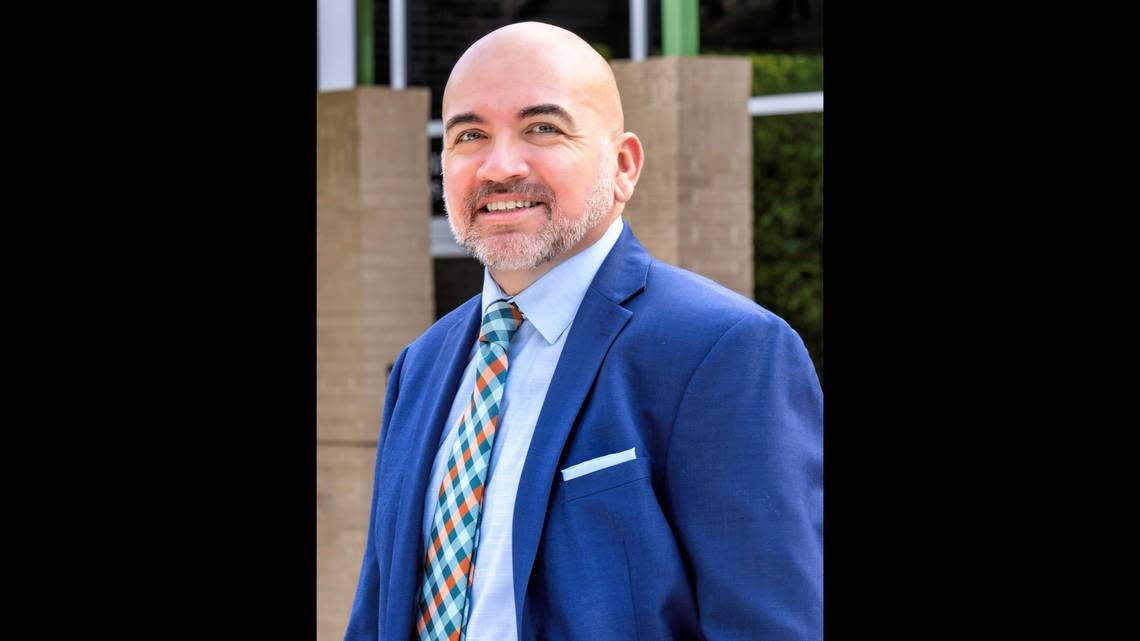Erik Valera, candidate for Chapel Hill Town Council

Chapel Hill will elect a new mayor and four Town Council members this year, giving voters a chance to check or continue the town’s current management and growth.
Council member Amy Ryan is the only incumbent seeking re-election. Council members Michael Parker and Tai Huynh will vacate their seats in December.
Council member Jessica Anderson’s seat is also open, as she runs against Council member Adam Searing to replace outgoing Mayor Pam Hemminger. Searing is supported by a bloc of four council candidates who have pledged to reverse some town decisions about housing and development.
Searing will remain on the council until December 2025 if he loses the mayoral race.
The Searing-aligned candidates — David Adams, Renuka Soll, Elizabeth Sharp and Breckany Eckhardt — are competing against Ryan and five others — Melissa McCullough, Jeffrey Hoagland, Erik Valera, Theodore Nollert and Jon Mitchell — to fill four council seats.
Early voting in the nonpartisan Nov. 7 election starts Oct. 19 and runs through Nov. 4..
To find polling places and full details on early voting, visit co.orange.nc.us/1720/Elections or contact the Board of Elections at 919-245-2350 or vote@orangecountync.gov.
Name: Erik Valera
Age: 50
Occupation: Community leader
Education: Bachelor of Arts In Communication, California State University-Los Angeles
Political or civic experience: I have over two decades of expertise in nonprofit management, public health and community engagement. I’m proud to do leadership work at El Centro Hispano and to hold key appointments on Gov. Roy Cooper’s Advisory Council on Hispanic/Latino Affairs and the Chapel Hill Town Planning Commission.
Campaign website: valeraforchapelhill.com
What do you think the town’s top three priorities should be? Choose one and describe how you will work to address it.
▪ Affordable Housing
▪ Equity and Inclusion
▪ Connecting our Communities
With my background and experience, I feel particularly passionate about celebrating our town’s diversity. It’s a multi-faceted issue; it means encouraging personal expression and creating spaces that reflect the diversity of Chapel Hill; ensuring equal access to resources and opportunities for all residents; and breaking down barriers between communities. We must amplify the voices of our Latinx, Black, Asian, student, and renting neighbors if we want Chapel Hill to be the best version of itself.
What do you think the town is doing right to create more affordable housing? What would you do if elected?
The town’s recent Affordable Housing Plan that was passed unanimously by the Town Council is an excellent step forward toward creating more affordable housing. If elected, I would work hard to ensure that the AHP is fully realized and implemented, and that the town continues to build off of the successes of that plan. This continued work would focus on empowering prospective homeowners and leaders, taking action against historic inequality, and continuing to build densely to increase accessibility.
Do you support keeping Orange County’s rural buffer, where the lack of water and sewer limits growth? How do you see the town growing with or without the buffer?
Maintaining the rural buffer is crucial to protecting our environment. Development should harmonize with nature rather than disrupt it, particularly by focusing on building in areas already impacted by human activity. This minimizes the risk of encroaching on the rural buffer and into natural environments and green spaces, which are crucial for biodiversity, recreation, and community well-being. We should promote vertical development and higher densities in designated areas, optimizing land use while preserving open spaces. In essence, growth should be strategic and deliberate, balancing the community’s economic and social needs with the imperative to protect and respect our environment.
Would you consider a tax increase to pay for rising costs and delayed public projects? If not, what specific changes to the town’s budget would you support?
It’s clear that we need to increase funding for our town. I would accept some forms of a tax increase if it was the best option, but there’s no reason for the town to rely solely on taxes as a source of funding. There are many other streams of capital that don’t place so much of the burden on our residents — I’d like to see the town explore these options. Some examples include implementing a new housing bond, leveraging federal funding from Biden’s Inflation Reduction Act, and placing more responsibility on UNC for the maintenance and development of our town.
How can the town bring people together who have different viewpoints to find workable solutions?
It truly is just about having good-faith conversations and education about the present problems and solutions. There are still many sections of the town which don’t interact enough with each other to understand the other side’s needs; I believe that making the town more walkable, inclusive, and providing more spaces to gather can help bridge some of these gaps in understanding. Short-term, making our town meetings and discussions more accessible is crucial. This means making translators much more accessible for written documents and for real-time discussions. More than anything, we need to be reaching out to the members of the community and reinforcing that we want, and need, their input.
The Orange Report
Calling Chapel Hill, Carrboro and Hillsborough readers. Check out The Orange Report, a free weekly digest of some of the top stories for and about Orange County published in The News & Observer and The Herald-Sun. Get your newsletter delivered straight to your inbox every Thursday featuring stories by our local journalists. Sign up for our newsletter here. For even more Orange-focused news and conversation, join our Facebook group "Chapel Hill Carrboro Chat."


